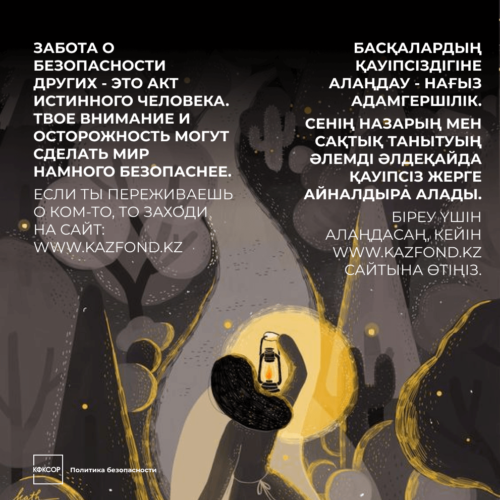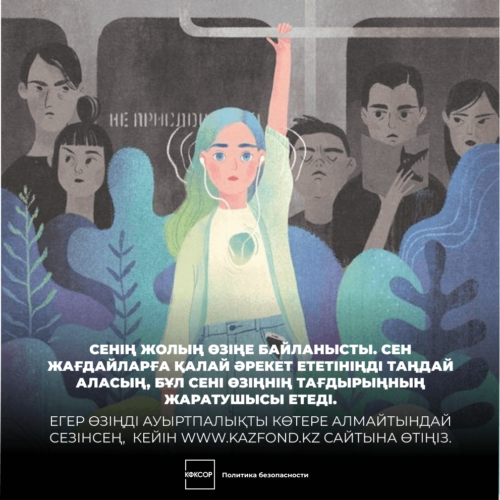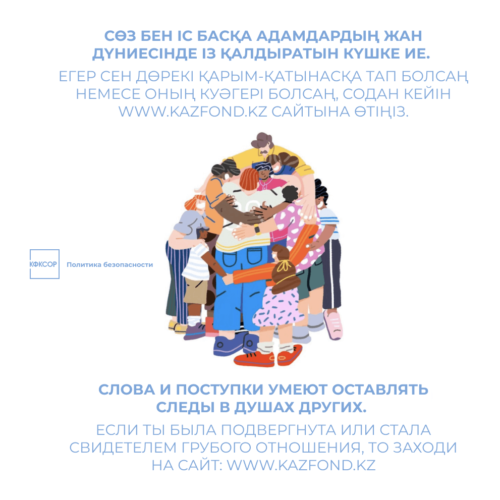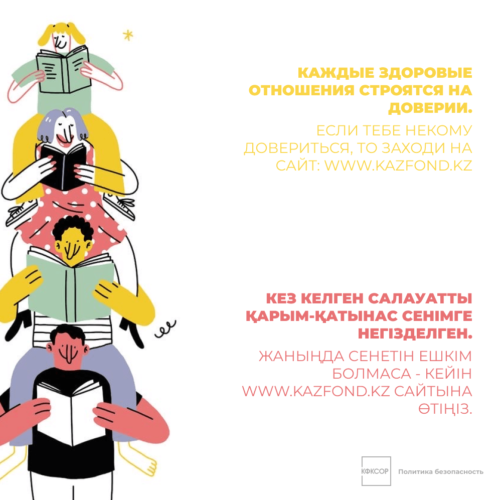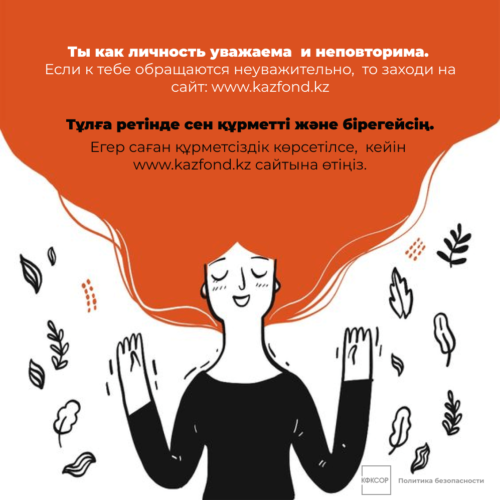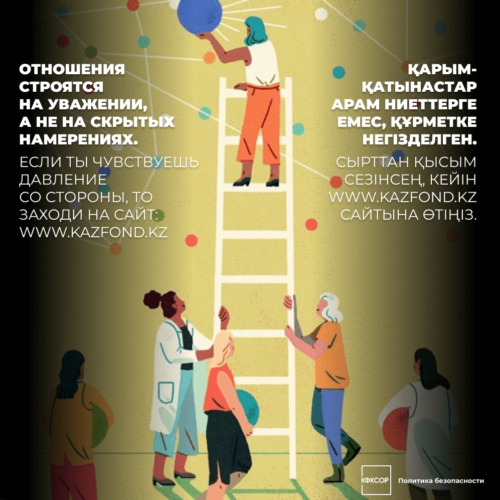Safeguarding Policy and Information
We are committed to keep children and adults (especially women of all ages) safe from harm and promote their wellbeing. This is specifically important for KFCSED because of the work we do and the links to our vision and mission.
Safeguarding Policy of Kazakhstan Foundation for Cultural Social and Educational Development
- Introduction
- Policy Statement
- Legislation and statutory guidance
- Key terms and definitions
- Roles and responsibilities
- Prevention
- Identifying harm and abuse
- Procedures for responding to harm and abuse
- Disseminating/Reviewing Policy and Procedures
1. Introduction
Kazakhstan Foundation for Cultural Social and Educational Development (henceforth KFCSED) is a non-profit that was founded in Almaty, Kazakhstan, in December 1999, with the goal of implementing social initiatives in order to encourage women’s development. Through training programs in different areas, KFCSED aims to strengthen women’s role in Kazakhstan society. Our efforts to drive social change are focused on three key pillars: empowering women by providing them education, promoting the idea of social responsibility and strengthening civic engagement. Therefore, KFCSED oversees the following projects involving mainly female students from Technical and Vocational Education and Training (TVET):
Kumbel is a leading project that promotes professional growth and personal development to young women helping their work insertion in the hospitality sector. It includes professional and life skills training sessions, as well as mentoring, and other activities.
Mira is a human rights project that includes interactive lectures on human rights from representatives of leading human rights organizations, training sessions on soft-skills, debate sessions, and a photo exhibition of student works.
IMPACTUM! is a self-development project for active and caring youth. This is a chance to get to know themselves, to learn how to get along with the environment, reveal an inner leader, to become more active, and to design their own social projects.
Kumbel Lab is a social project aimed to support and inspire young women studying in the STEM programs by providing high-quality alternative education.
Mayak is a mentoring program, where caring professionals share their knowledge, skills, and abilities with an inexperienced beginner (a teenager in our case) for a certain period.
Kumbel Pro – a project to enhance the potential of teachers, which contributes to professional growth and personal development. Teachers take part in training in professional and life skills, as well as mentoring, and other activities.
Mayak PRO is a mentoring program within the framework of the Kumbel PRO project, where university educators and higher education professionals share their knowledge and experience with TVET teachers throughout the duration of the Kumbel PRO initiative.
Azhar – it is a vocational internship project with accommodation opportunities for professional growth and personal development to young women helping their work insertion in the hospitality sector.
Therefore, this policy will enable KFCSED to demonstrate its commitment to keeping safe all people at risk, in particular girls and women, who are beneficiaries of KFCSED with whom it works alongside. KFCSED acknowledges its duty to act appropriately to any allegations, reports or suspicions of abuse. Furthermore, the Policy will apply to all staff, board members, beneficiaries, volunteers, consultants, visitors, partners, donors, and anyone else who works for or on behalf of KFCSED across all our project locations.. Hereby, all above mentioned stakeholders are to be referred as ‘personnel’. KFCSED will ensure that it has made all personnel aware of its safeguarding policy. KFCSED will provide all stakeholders with this policy and ensure they understand it. KFCSED will also explain the reporting process should they be concerned about a fellow client or member of staff. The Policy will apply to the whole of the KFCSED, including all its projects and activities (as outlined above): professional education in hospitality schools, leadership skills, human rights and technology and science, as well as adult projects (vocational skills, mentoring programs).
2. Policy Statement
We are committed to keep children and adults (especially women of all ages) safe from harm and promote their wellbeing. This is specifically important for KFCSED because of the work we do and the links to our vision and mission. Our vision is empowering women, empowering society. Our mission is to engage women in social initiatives and make them main actors of their own development and positive role models for their communities. Our values are a positive approach, instead of focusing on what is wrong, we build on women’s strengths and skills. We believe in people and we rely on building and strengthening relationships among them; integrity, we aspire to be consistent, honest and truthful and always act in the best interest of our beneficiaries; consistent growth, we work together, making sure progress toward our goals but we are not afraid of taking risks and challenge ourselves; commitment and passion, we are enthusiastic and passionate about our work. That is why we are always ready to improve ourselves and to share what we know; accountability, we take responsibility for each decision and action that we take.
The policy and procedures are in place so that personnel work to prevent abuse and know what to do should a concern arise. They will enable KFCSED to:
- Promote good practice and work in a way that can prevent harm and abuse occurring.
- Ensure that any allegations of abuse or suspicions are dealt with appropriately and the person experiencing abuse is supported.
- Identify adults, children and young adults who may be in need of extra help.
- Ensure that all members of staff, volunteers, visitors, consultants, donors and partners are able to assist adults, children and young adults to be safe.
- Give a clear direction for those working for, and on behalf of KFCSED on the expected behavior and our responsibilities to safeguard and promote the welfare of all adults, children and young adults.
KFCSED fully recognizes the contribution it can make to protect adults and children from harm and supporting and promoting the welfare of those coming into contact with our organization. The elements of our policy are prevention, protection and support.
This policy applies to all personnel.
3. Legislation and statutory guidancet
In developing this policy and any associated procedures and guidance, we have made reference to the following legislation/guidance linked below:
- United Nations Convention on the Rights of the Child
- United Nations Convention on the Elimination of All Forms of Discrimination against Women
- The Constitution of the Republic of Kazakhstan
- On the rights of the child in the Republic of Kazakhstan
- Law of the Republic of Kazakhstan dated August 8, 2002 No. 345-II
- On the rights of the child in the Republic of Kazakhstan (with amendments and additions as of 05/03/2022)
- On State Guarantees of Equal Rights and Equal Opportunities for Men and Women (as amended as of 01.07.2021)
4. Key terms and definitions
Key safeguarding terms and definitions:
- Child
- Young adults
- Adult at risk
- Vulnerable Individuals
- Personnel
- Staff
- Consultant
- Volunteer
- Visitor
- Partner
- Board member or trustee
- Founders
- Donor
- Safeguarding
- Confidentiality
- Discrimination
- Child or young adults neglect
- Emotional maltreatment or abuse
- Exploitative relationship
- Physical maltreatment or abuse
- Self-harm
- Suicidal behaviour
- Sexual harassment
- Sexual abuse
- Sexual exploitation
Child
The terms “child” and “children” refer to anyone under the age of 18.
Young adults
Anyone aged from 18 to 23 who are (participants) / beneficiaries of the projects. They are still dependent on their parents, not fully independent and not fully formed as adults. They can be easily influenced.
Adult at risk
An adult at risk is defined as a person aged 18 and over who is experiencing, or is at risk of (they could be exposed to), abuse or neglect and as a result of physical, social, economic and environmental factors – is unable to protect themselves.
Vulnerable individuals
Individuals who hold less power in society, are more dependent on others for survival, are less visible to relief workers, or are otherwise marginalized.
Personnel
This is taken to mean anyone associated with KFCSED, whether they are a paid contracted staff member, beneficiary, consultant, partner, volunteer, visitor, or other appointed or temporary representative such as a journalist, celebrity, or translator.
Staff
A person who works for or represents the KFCSED organization. This is taken to mean anyone associated with our organisation that is a paid contracted staff member.
Consultant
People who are not employees but are contracted by KFCSED for specific pieces of work on a paid or pro bono basis, to help KFCSED attain goals and solve problems.
Volunteer
An individual who freely offers their time, labor, and expertise for projects, training and events organized by KFCSED. KFCSED recognizes mentors, lecturers, trainer-professionals, and interns as volunteers.
Visitor
A person from outside KFCSED visiting someone or somewhere, especially socially within foundations building or events organized by it. By visitors KFCSED recognizes parents and acquaintances of beneficiaries.
Partner
A person or an institution who shares or is associated with the KFCSED in some action or endeavor. Following is the list of organizations that are associated with KFCSED organization: TVET organizations, hotels and restaurants, other hospitality related organizations or individuals; other NGOs, other specialists and professionals depending on their involvement purposes aligned with each project’s objectives and other corporations sponsoring KFCSED programs.
Board member or Trustee
The Members of the Board or Trustees are persons not related by marriage and close kinship to KFCSED staff. The General Meeting of Founders elects them. They act constantly as a collegial governing body to ensure the implementation of KFCSED programs and raising funds for their funding.
Founder
Founders are authorized people as the members of the General Assembly of Founders, which is the supreme body of management of KFCSED. The exclusive competence of the General Assembly of the Founders includes defining the priorities of the activity, formation of the management bodies, and decision-making on the most important issues concerning the activity of KFCSED.
Donor
A person who donates something, especially money to charity.
Safeguarding
KFCSED recognizes the responsibility that as an organization it has to make sure personnel, operations, and programmes do no harm to adults, children, young adults and vulnerable adults, and that they do not expose them to the risk of harm and abuse. KFCSED aims to protect an individual’s right to live in safety, free from abuse and neglect. Also, KFCSED is committed to promoting good practice and working in a way that can prevent harm and abuse from occurring; ensuring that any allegations of abuse or suspicions are dealt with appropriately and the person experiencing abuse is supported; identifying adults, children, and young adults who may need extra help; ensuring that all members of staff, volunteers, visitors, consultants, donors, and partners are able to assist adults, children, and young adults to be safe.
Confidentiality
Maintaining confidentiality means not disclosing any information at any time to any party without the informed consent of the person concerned. If someone suspects that a child or vulnerable person is being abused, they have to report it, with or without that person’s consent. This needs to acknowledge that when a person is suspected of being at risk they will always be informed in advance how their personal information will be shared and with whom, and only on a need to know basis only.
Discrimination
KFCSED acknowledges discrimination occurs when you are treated less favorably than another person in a similar situation and this treatment cannot be objectively and reasonably justified.
Child or young adults neglect
Neglect or negligent treatment means the failure to meet children’s or young adults’ physical, psychological, emotional or educational needs; as well as lack of protection from danger or isolation from their communities or other services.
Emotional maltreatment or abuse
Sequences of actions or behavior that negatively impacts on a child’s, young adults or an adult’s emotional development. Emotionally abusive acts include restriction of movement, degrading, humiliating, bullying (including cyber bullying), and threatening, scaring, discriminating, ridiculing or other non-physical forms of hostile or rejecting treatment (such as ignoring someone when they need help). If it is persistent it is considered emotional abuse.
Self-harm
Self-harm is the deliberate act of inflicting physical harm on oneself as a means of managing intense emotions or under the influence of third parties. While it is not a suicide attempt, self-harm can increase the risk of engaging in suicidal behavior.
Suicidal behaviour
Suicidal behavior encompasses a range of actions or thoughts that indicate an individual’s intention or risk of taking their own life, which can include self-harm, suicide attempts, persistent thoughts of suicide, or even planning one’s suicide attempt.
Exploitative relationship
Exploitative relationships consist of one party taking advantage of another, using an imbalance of power to control another, or to unrightfully benefit from another’s vulnerabilities. Child or young adult exploitation refers to the use of children for someone else’s advantage, gratification or profit often resulting in unjust, cruel and harmful treatment of the child.
In KFCSED there is a risk this could happen in the context of power relationships between mentor and mentee. This excludes the cases when internships are not harmful and their purpose is to help them to advance their skills and knowledge with limited hours and in alignment with local Kazakhstani legislations.
Physical maltreatment or abuse
Actual or potential harm perpetrated by another person, adult or child. KFCSED recognizes physical abuse as physical injury inflicted on a person, adult or child by other than accidental means. The statutes define physical injury as anything from severe or frequent bruising to more serious injuries.
Sexual harassment
Any unwelcome sexual advance, request for sexual favor, verbal or physical conduct or gesture of a sexual nature, or any other behavior of a sexual nature that might reasonably be expected or be perceived to cause offense or humiliation to another. Sexual harassment is particularly serious when it interferes with work, is made a condition of employment or creates an intimidating, hostile or offensive environment. Sexual harassment may occur outside the workplace and/or outside working hours. While typically involving a pattern of behavior, it can take the form of a single incident. Sexual harassment may occur between or amongs persons of the opposite or same sex.
Sexual abuse
The actual or threatened actions of a sexual nature, whether by force or under unequal or coercive conditions. All sexual activity with a child is considered sexual abuse. Sexual abuse is a broad term, which includes a number of acts, including rape, sexual assault, and sex with a minor, and sexual activity with a minor.
Age of consent 16: https://kodeksy-kz.com/ka/ugolovnyj_kodeks/122.htm
Sexual exploitation
KFCSED defines sexual exploitation as an actual or attempted abuse of someone’s position of vulnerability (such as a person depending on you for survival, food rations, school, books, transport or other services), differential power or trust, to obtain sexual favors, including but not only, by offering money or other social, economic or political advantages. It includes trafficking and prostitution.
5. Roles and responsibilities
This section highlights the KFCSED personnel designated to take responsibility for safeguarding issues. Their primary responsibilities are as follows:
- Raise safeguarding awareness to ensure that everyone prevents, recognizes, and responds to abuse and exploitation.
- Ensure that all personnel are aware of and understand the safeguarding policy and procedures.
- Implement the correct safeguarding procedures when abuse has happened or is suspected of occurring.
- Collaborate with other agencies to secure and protect the wellbeing of people associated with KFCSED.
- Make oneself available to all personnel to address any safeguarding problems or concerns.
The specific responsibilities of each role are:
President – Overall responsibility and accountability for safeguarding in the KFCSED. Is kept informed of all safeguarding issues regularly by the Safeguarding Coordinator and is directly involved in any cases involving criminal activity. The President also reviews all risk assessments rated as ‘high’. The President must also comply with the Safeguarding Policy. In situations where the Safeguarding Coordinator is unavailable or is directly involved in an allegation of abuse, the President will either directly manage the investigation or nominate another senior staff member to fulfill this role, under the supervision of the President.
Safeguarding Coordinator – Overall responsibility for project managing and implementing all prevention and response related safeguarding work, including managing safeguarding investigations. Keeps the President informed regularly of all work, and directly involves the President in cases where criminal activity is suspected or risks assessments indicate a ‘high’ risk activity. Works in close coordination with the Administrative Manager and President.
Administrative Manager – Responsibility for managing all administrative and information management aspects of safeguarding in close coordination with the Safeguarding Coordinator and the President.
Project Coordinators – Specific safeguarding responsibilities in relation to their own projects, and are expected to work closely with the Safeguarding Coordinator and Administrative Manager on safeguarding issues.
6. Prevention
KFCSED is committed to carrying out the following procedures to mitigate the risks regarding each project.
Risk assessments
Risk assessments will be carried out for all projects and all new activities. See Annex.
Recruitment
KFCSED will ensure that the provisions in the Safeguarding Policy are included in KFCSED’s recruitment procedure, so that it prevents recruiting personnel that may cause harm. These prevention actions will include:
- Thorough background checks and screening of possible workers and volunteers via EGov criminal background checks and references.. This concerns all the personnel who have direct access to children, young adults or vulnerable adults.
- Make it clear in job postings that applicants must adhere to the safeguarding policy and procedures.
- Ask questions about safeguarding during interviews to determine applicants’ level of understanding and commitment to safeguarding.
- To demonstrate commitment to the safeguarding policies and procedures, all personnel will be expected to read, understand, and sign their names against the Safeguarding Policy and Code of Conduct.
MoUs with partnering organisations
KFCSED will put in place a memorandum of understanding with any external organisations it partners with and with which its beneficiaries are engaging in activities or internships, for example, a hotel where students are engaged in hospitality internships. The memorandum of understanding will ensure that the external partner organisation is committed to ensuring that KFCSED beneficiaries will always be protected in accordance with the KFCSED Safeguarding Policy and Code of Conduct whilst in the care of the eternal partner organisation.
A Code of Conduct
See Annex
Awareness raising and training of personnel
KFCSED will ensure all personnel understand the Safeguarding Policy and Procedures, as well as ensuring its beneficiaries and partners also understand these, and how they relate to them. These awareness raising activities will include:
- training for personnel, beneficiaries and partner organizations;
- developing simplified versions of the Policy and Procedures so everyone understands them (e.g. posters in meeting rooms, translated versions in local languages, child-friendly versions, etc).
- New workers will be expected to read and confirm their understanding of the KFCSED policy and procedures, as well as sign the safeguarding policy and code of conduct. During their introduction phase, they will also get safeguarding instruction.
- The KFCSED safeguarding policy and procedures will be distributed to all involved personnel and they will be expected to sign that they have read, understood and agree to these. Opportunities will be given to answer any questions or queries they have.
- Updates to the KFCSED safeguarding policy or procedures will be emailed to all KFCSED personnel and efforts will be made to make sure they understand these updates.
Communication guidelines
The KFCSED is committed to:
- Maintaining confidentiality and ensuring that information pertaining to the safeguarding process is secure at all times.
- Before sharing any information about beneficiaries’ in any communications materials, their permission will be obtained.
- Not including any personal or intimate information about any beneficiary in communications materials, unless they have given explicit permission for this.
- Maintain the dignity of beneficiaries while sharing photographs or information about them in any communications medium.
7. Identifying harm and abuse
Physical Abuse
Types of physical abuse:
- Assault, hitting, slapping, punching, kicking, hair-pulling, biting, pushing
- Rough handling
- Scalding and burning
- Physical punishments
- Inappropriate or unlawful use of restraint
- Making someone purposefully uncomfortable
- Involuntary isolation or confinement
- Misuse of medication (e.g. over-sedation)
- Forcible feeding or withholding food
- Unauthorized restraint, restricting movement (e.g. tying someone to a chair)
Possible warning signs of physical abuse:
- No explanation for injuries or inconsistency with the account of what happened
- Injuries are inconsistent with the person’s lifestyle
- Bruising, cuts, welts, burns and/or marks on the body or loss of hair in clumps
- Frequent injuries
- Unexplained falls
- Subdued or changed behavior in the presence of a particular person
- Signs of malnutrition
- Failure to seek medical treatment or frequent changes of GP
Sexual Abuse
Types of sexual abuse:
- Rape, attempted rape or sexual assault
- Inappropriate touch anywhere
- Non-consensual masturbation of either or both persons
- Non-consensual sexual penetration or attempted penetration of the vagina, anus or mouth
- Any sexual activity that the person lacks the capacity to consent to
- Inappropriate looking, sexual teasing or innuendo or sexual harassment
- Sexual photography or forced use of pornography or witnessing of sexual acts
- Indecent exposure
Possible indicators of sexual abuse:
- Bruising, particularly to the thighs, buttocks and upper arms and marks on the neck
- Torn, stained or bloody underclothing
- Bleeding, pain or itching in the genital area
- Unusual difficulty in walking or sitting
- Foreign bodies in genital or rectal openings
- Infections, unexplained genital discharge, or sexually transmitted diseases
- Pregnancy in a woman who is unable to consent to sexual intercourse
- The uncharacteristic use of explicit sexual language or significant changes in sexual behavior or attitude
- Incontinence not related to any medical diagnosis
- Self-harming
- Poor concentration, withdrawal, sleep disturbance
- Excessive fear/apprehension of, or withdrawal from, relationships
- Fear of receiving help with personal care
- Reluctance to be alone with a particular person
- Reservation, fear to share, isolation, shame, not participating in social events or projects
- Being aggressive channeled outside, especially towards opposite sex
- PTSD symptoms
Psychological/Emotional Abuse
Types of psychological or emotional abuse:
- Enforced social isolation – preventing someone accessing services, educational and social opportunities and seeing friends
- Removing mobility or communication aids or intentionally leaving someone unattended when they need assistance
- Preventing someone from meeting their religious and cultural needs. Or forcing someone to engage in religious activities against their will.
- Preventing the expression of choice and opinion
- Failure to respect privacy
- Preventing stimulation, meaningful occupation or activities
- Intimidation, coercion, harassment, use of threats, humiliation, bullying, swearing or verbal abuse
- Addressing a person in a patronising or infantilising way
- Threats of harm or abandonment
- Cyber bullying
- Manipulation
- Gaslighting
- Silent treatment
Possible indicators of psychological or emotional abuse:
- An air of silence when a particular person is present
- Withdrawal or change in the psychological state of the person
- Insomnia
- Low self-esteem
- Uncooperative and aggressive behavior
- A change of appetite, weight loss/gain
- Signs of distress: tearfulness, anger
- Apparent false claims, by someone involved with the person, to attract unnecessary treatment
- Codependence
- Self-harm
- Oversharing
Neglect and Acts of Omission
Types of neglect and acts of omission:
- Failure to provide or allow access to food, shelter, clothing, heating, stimulation and activity, personal or medical care
- Not taking account of individuals’ cultural, religious or ethnic needs
- Not taking account of educational, social and recreational needs
- Ignoring or isolating the person
- Preventing the person from making their own decisions
- Failure to ensure privacy and dignity
- Failure to provide measures regarding global pandemic situation
- Failure to provide safe time period to travel between locations
Possible indicators of neglect and acts of omission:
- Poor environment – dirty or unhygienic
- Poor physical condition and/or personal hygiene
- Pressure sores or ulcers
- Malnutrition or unexplained weight loss
- Untreated injuries and medical problems
- Inconsistent or reluctant contact with medical and social care organisations
- Uncharacteristic failure to engage in social interaction
- Inappropriate or inadequate clothing
Self-harm
Types of self-harm:
- Cutting
- Swallowing hazardous material or substances
- Burning
- Over/under-using medication
- Hitting/ punching/ head banging
- Skin picking
- Scratching
- Hair pulling
- Alcohol or drug misuse
- Eating disorders, such as deliberately starving yourself, binge eating or bulimia
- Self-strangulation
Possible indicators of self-harm:
- Сuts, burns, or bruises on the arms, wrists, thighs, or other body parts
- Wearing long sleeves or pants even in hot weather to hide their injuries
- Withdrawal from social activities or isolation
- Finding razors, knives, or other sharp objects in a person’s belongings without a clear reason
- Repeated unexplained injuries or wounds over time
- Expressing feelings of sadness, hopelessness, or helplessness, or difficulties in handling emotions
- Sudden changes in behavior, such as increased irritability, mood swings, or trouble concentrating
- Untreated injuries and medical problems
Suicidal behaviour
Types of suicidal behaviour:
- Feeling sad or irritable more often than not
- Sleeping or eating more or less than usual
- Showing little to no interest in pleasurable activities
- Withdrawing from others
- Participating in reckless behavior that is out of character
- Engaging in self-injurious behavior
- Having trouble concentrating or performing poorly in TVET or at work
- Increasing use of alcohol and drugs
Possible indicators of suicidal behaviour:
- Talking to others or posting on social media about suicide or wanting to die
- Explicitly stating their intention to die by suicide, such as “I want to kill myself.”
- Sudden and noticeable changes in behavior, mood, or social interactions, such as withdrawal from friends and family.
- Looking for ways to kill themselves: gathering medications, sharp objects or firearms, searching online for ways to end their life
- Complaining frequently about physical symptoms (e.g., fatigue, stomachaches, headaches)
Visiting or calling people to say “goodbye”
- Giving away prized possessions
- Suddenly becoming calm or cheerful after a long period of depression
- A change of appetite, weight loss / gain
8. Procedures for responding to harm and abuse
This section outlines the procedures to follow when there is a suspicion or allegation of abuse, or harm, or harassment against a KFCSED employee or related personnel. It also outlines how the report is responded to by the organisation and the possible steps to be taken as a result of the investigation.
Hereby, KFCSED is committed to always support the victims of abuse regardless of the seriousness of the abuse and to provide support appropriate to the needs. Our organization’ first and foremost concern is that the victim is safe. To add to this, our organization is committed to getting support from external organizations – including other women’s organizations – and partners depending on each individual case.
In any situation where a person suspects or is made aware of any abuse or harm to any other person, it is essential that they report it to a Project Coordinator or Safeguarding Coordinator using the procedures set out below.
Abuse or harm is reported by the victim
When a beneficiary or personnel reports abuse to anyone who is associated with or acts on behalf of the KFCSED, that individual is obligated to take the following steps:
- Listen carefully and stay calm.
- Be sympathetic and unbiased
- Gather information – why, where, who, when, how, and so on.
- Instead of interviewing the person, simply ask them normally (using only open-ended questions) and without putting them under any pressure to ensure that they comprehend what they are saying.
- Avoid putting words in the person’s mouth and asking leading questions.
- Assure the individual that by informing you, he or she has done the right thing.
- Inform the individual that you must forward the information to the Project Coordinator or Safeguarding Coordinator to ensure that he or she is properly cared for.
- Take meticulous notes on the major points.
- Inform the relevant Project Coordinator or the Safeguarding Coordinator.
- Ensure that an Incident Report Form is completed by the person who has been made aware of the abuse and/or by the Project Coordinator, and that this form is submitted to the Safeguarding Coordinator as soon as possible – see here for an online link to the Incident Reporting Form.
- Maintain complete confidentiality at all times.
In each case, the staff receiving the report should not investigate concerns or allegations themselves, but should immediately report them to the Project Coordinator, or the Safeguarding Coordinator who will take forward the case from here.
When there is a suspicion of abuse or harm, the following approach should be followed:
- Do not undertake your own investigation into your suspicions and this may alarm the alleged victims. An investigation should only be carried out by the Safeguarding Coordinator.
- Take meticulous notes on the situation and why you suspect abuse or harm.
- Confidentially inform the relevant Project Coordinator.
- Ensure that an Incident Report Form is completed by the person who suspects abuse and/or by the Project Coordinator, and that this form is submitted to the Safeguarding Coordinator as soon as possible – see here for an online link to the Incident Reporting Form.
- Maintain complete confidentiality at all times.
Investigation by the Safeguarding Coordinator
The Safeguarding Coordinator will conduct the investigation, with support from the relevant Project Coordinator, in the following manner:
- Immediately inform the President that an Incident Report Form has been received and an investigation will now begin. Ensure that the President is kept updated at all stages. This is particularly important if the allegations are serious and/or result in a finding that the Safeguarding Policy has been breached.
- Speak with the victim and all other parties involved to gather information about the alleged abuse. The Project Coordinator may be asked to assist in this process.
- A physical examination may be performed by medical staff of the same sex in the presence of a third party, also of the same sex, if necessary.
- Offer and arrange for emotional and social support to the victim, as well as medical assistance if necessary.
- Maintain the confidentiality of all information and conversations.
- Create a case file that includes the date, time, location, what the individual said, did, and the questions you asked, and so on.
- Ensure that all investigation-related records are preserved in a secure and confidential location.
- Determine if there was a violation of the safeguarding policy based on the investigation results.
When there is a violation of the safeguarding policy, the Safeguarding Coordinator will:
- Determine whether or not a crime has been committed.
- If a crime has been committed, immediately notify the President and with their support notify the appropriate law enforcement body as soon as possible. If it is not safe to do so, obtain guidance from the appropriate external agency.
- Adhere to the instructions of the appropriate law enforcement or other agency.
- If the violation is not a criminal but a violation of the code of conduct, take appropriate disciplinary action against the person.
- Take any additional relevant action, such as risk assessment, recommendations for amending the safeguarding policy, and so on.
- Complete the case and close the case file.
- Ensure that all investigation-related information and records are preserved in a safe and confidential place.
Where there has been no violation of the safeguarding policy, the Safeguarding Coordinator will:
- Determine whether there are any connected risks to other individuals or the organization.
- Take any necessary action, such as risk assessment or suggestions for amending the safeguarding policy.
- Close the case file and close the case.
- Ensure that all investigation-related information and records are retained in a safe and confidential location.
Where the Project Coordinator is involved in the accusation:
- The incident will be reported immediately to the Safeguarding Coordinator.
- The Safeguarding Coordinator will then examine the problem using the above protocol.
If the Safeguarding Coordinator is implicated in the claim or cannot perform their duties:
- The event will be reported straight to the President.
- The matter will subsequently be investigated by the President in accordance with the procedure outlined above.
In cases where a suspicion or allegation or abuse or harm relates to a situation outside of the KFCSED’s projects, the Safeguarding Coordinator should not carry out an investigation themselves, but refer the matter to the appropriate authorities and/or seek advice from an appropriate external professional organisation. The victim should still be offered emotional, social and medical support if needed. In a situation where it is not immediately apparent that the abuse or harm has occurred outside of KFCSED’s projects, the investigation should still go ahead, but upon recognising that there is an external element then the investigation should stop into these external events and the relevant authorities or professional organisations should be informed.
In cases of self-harm and/or suicidal behavior, similar procedural measures should be applied, with a heightened focus on conducting investigations and interacting with the individual with greater sensitivity and offering psychosocial support to the victim.
9. Disseminating/Reviewing Policy and Procedures
This safeguarding policy and procedures will be clearly communicated to personnel: staff, beneficiaries, volunteers, consultants, partners, and visitors. The Safeguarding Coordinator will be responsible for ensuring that this is done.
The safeguarding policy and procedures will be reviewed annually by KFCSED. The Safeguarding Coordinator will be involved in this process and can recommend changes. The Safeguarding Coordinator will also ensure that any changes are clearly communicated to personnel. It may be appropriate to involve personnel.
This policy is subject to collective review and editing as necessary.
This policy is signed in Almaty on September 1st, 2023
Commit to Code of Conduct as a project participant
Commit to Code of Conduct as an staff member, mentor or trainer:
Code of Conduct of Kazakhstan Foundation for Cultural Social and Educational Development
This Code of Conduct complements KFCSED’s existing Safeguarding Policy, and any violation of the Safeguarding Policy and this Code of Conduct is a serious concern and may result in disciplinary action, up to and including dismissal. All staff and related personnel must read and sign this Code of Conduct (see above).
As a KFCSED student, staff or/and related personnel, I will –
- give respect and dignity to all students and staff associated with the work of KFCSED;
- create and maintain a safe, positive organizational culture that encourages open communication, trust and healthy relationship;
- try to prioritize my physical and mental health and, by doing so, be a model of good practice for others to do the same.
- respect the right to personal privacy of KFCSED students and its staff;
- maintain confidentiality about any concerns or information I am aware of and only share information with staff of the appropriate function who need to know such information;
- will only share, store and use KFCSED information and data using official KFCSED email accounts and data storage systems provided by the organisation.
- support students to make their own choices, make informed decisions, and control their lives;
- teach students to assess what is acceptable and unacceptable both in staff behavior and in their dealings with other students and staff.
As a KFCSED student, staff or/and related personnel, I will not –
- harm or abuse students or/and staff in any way at any time;
- differently treat or favor a particular student or/and a staff member to the exclusion of others;
- use language or behavior towards staff and students that is intended to shame, humiliate, belittle, sexually abuse, undermine students’ and staffs’ self-esteem or otherwise perpetrate any form of psychological abuse, emotional abuse or/and maltreatment;
- discriminate or use discriminatory language towards students or/and staff members regarding their gender, age, ethnicity, nationality, disability, political and religious background, social status, pregnancy and maternity, marriage, and civil partnership;
- use a position of power to exploit or make students or/and staff members to do something for my own advantage;
- use KFCSED staff members’, and students’ names, phone numbers, images, videos, confidential documents, documents with private information regarding KFCSED or/and any other personal information without their explicit consent;
- drive a student in my car, invite to my home or be alone in an enclosed space;
- physically interact with students and staff members in any way that is inappropriate and unacceptable to my professional role I have agreed to perform at KFCSED;
- engage in any sexual activity or sexual relationship with any KFCSED student of any age or other personnel.
For a detailed description of Key Terms and Definitions mentioned above, please refer to Safeguarding Policy. For a detailed description of discrimination, please refer to Safeguarding Policy.
In case there is a concern or suspicion regarding abuse, harm, or harassment towards KFCSED staff or related personnel, please see our Safeguarding Policy Procedures for Responding to Harm and Abuse.
Your safety matters to us. We are committed to maintaining a safe and respectful environment within our organization. If you have witnessed or experienced an incident that raises concerns related to our safeguarding policy or code of conduct, please use our Incident Reporting Form to bring it to our attention.
Your reports will be handled with the utmost care and confidentiality. We encourage open communication to help us address any issues and ensure the well-being of everyone in our community.
Thank you for your commitment to our collective safety.
One of KFCSED’s core values is our positive approach. We believe in people and we rely on building and strengthening relationships among them. At KFCSED, we cherish the inherent potential within every individual.
Our awareness materials are a constant reminder of this infinite worth. Join us in commemorating the force of positivity and personal development. By downloading our safeguarding materials, you’re contributing to a community that thrives on individual and collective strength.
Download Now and Embrace Empowerment!
We extend our gratitude for being a part of KFCSED and for embarking on this journey.
Empowering women. Empowering society.
If you have any questions, concerns, or need assistance regarding our safeguarding efforts, please feel free to get in touch with our dedicated team:
Our safeguarding team is here to support you and ensure a safe environment for everyone. Your concerns and well-being are our top priorities.
Feel free to reach out to us anytime.





